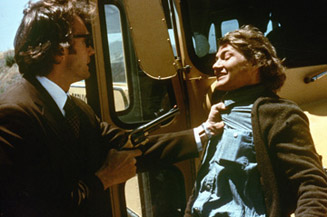|
|
Viking Night: Dirty HarryBy Bruce HallJune 22, 2010
To us, the idea of a wisecracking police detective with a hand cannon and an itchy trigger finger seems more than a little passé. But put yourself in the shoes of a moviegoer circa 1971 – Clint Eastwood was still best remembered as television’s Rowdy Yates. Westerns and sprawling period pictures were quickly being replaced by a new generation of cultivated drama, intelligent comedies and explosive action flicks. Steve McQueen still reigned as the definitive big screen gumshoe, but Bullitt was a confusing mess and despite his rough edges and world class driving skills the title character came across as more of a thespian than a thug. The concept of a cop as anti-hero was still a novel one, and the very notion of a graphically violent, profanity studded action movie positioning itself as a concept piece seemed almost ludicrous. But Dirty Harry was all of those things, and while it’s not exactly a masterpiece, it is undeniably the first of its kind. It stands apart both from its impersonators and less distinguished sequels as an enduring thriller. And it's not only a fun ride, but along the way it poses some pretty timely questions on the subject of law and order versus civil liberty. Hard nosed San Francisco police detective Harry Callahan isn’t like the rest of the boys in his department. In fact he reminds me a bit of myself - not because he’s tall, handsome, likes big guns and looks cool in a tweed jacket (only two of those things are true about me). It’s because Harry is a dour, standoffish loner who is frequently disciplined for thinking outside the box, but he keeps his job because he gets results. He’s intelligent but impulsive; he has a refined intuition but rarely the patience to use it. But there’s one thing in particular that differentiates Harry from the thugs he runs down as well as his humorless, regulation quoting peers. He harbors a deep, genuine compassion for the victims of violent crime and a seething contempt for reformers and intellectuals who are less interested in the application of justice than they are in making sure nobody’s feelings get hurt in the process.
|

|
|
|

|
Friday, November 1, 2024
© 2024 Box Office Prophets, a division of One Of Us, Inc.


